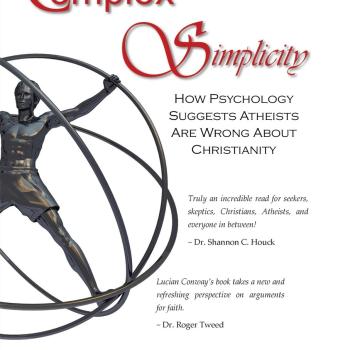Introduction
Psychology, in terms of study and practice, began as a focused on a sort of poorly-defined concept of the “mind,” whatever that may be. In fact, many of the early forays into psychology, Frued, Jung, James, and the like, spent their time trying to define what the “mind” even was. Skinner came along and did away with the idea of a mind altogether, and in modern times the “mind” is largely considered an emergent property of the brain.
But for the religiously inclined, humans are still thought to have an immaterial aspect usually called the “soul.” If the soul is the animating force behind human thought and behavior, should psychology be focused on the nurture, healing, and care of the soul primarily? Some Christian psychologists believe that it should.
Transformational Psychology
Transformational psychology is the view that the primary focus of psychology, and especially the therapies and interventions which result from psychological study, should be the focus on “soul care.” In their chapter in the book Psychology and Christianity Five Views (Johnson, 2010), John H. Coe and Todd W. Hall argue that psychology is, or should be, primarily an act of love (Johnson, 2010, p. 190). They say that, in their view, the early founders and writers of Judaism and Christianity (referred to, in the book, as “Desert Fathers”) had meaningful insights into the nature of human beings and their soulical nature that have been lost to the modern world of empirical science. They say that:
“The transformational psychology model is an attempt to both rediscover and redesign the traditional way of thinking about psychology and Christianity, as well as the nature of science itself.” (Johnson, 2010, p. 190)
Despite its focus on the wisdom of the sages and on “soul care,” Coe and Hall do not disparage the use of science, and say of Transformational Psychology that it, “…is a unified yet complex science that is open to all relevant data and reality…” (Johnson, 2010, p. 196). Coe and Hall also incorporate a great deal of data and systematic methodology into their chapter, contradicting any notion that Transformational Psychology is science-averse.
Because Transformational Psychology is a system of integrating both science and Christian practice and belief, it resembles the philosophy and methodology incorporated into Integrationism as defined by Stanton L. Jones (Johnson, 2010, p. 97-117). In an early version of Psychology and Christianity, Johnson presented these two approaches under the same school of thought, but in the 2010 edition, presented Integrationism and Transformational Psychology as two separate schools of thought (Johnson, 2010, p. 33). The question, then, becomes, is the difference between these two approaches so significant that it merits defining them as two separate schools of thought? This is the question this paper will address.
Defining Integrationism
In Johnson’s book on five different views of psychology (Johnson, 210), he addresses the question as to how ought Christians approach the subject of psychology in light of Christianity. Assuming a Creator God and the truth of the Bible, there is some doubt cast upon any methodology that would present human beings as biological mechanisms, a form of life equivalent to any other primate, or existing purely within the realm of empirical observation. Taking the Bible into account, one must allow that there must be something unique about human nature that transcends the merely material. This being so, Johnson contends that it is worth considering what Christians ought to make of psychology as a science, and could it have any place in Christian thought and practice?
To answer this question, Johnson presents five potential means of reconciling Christianity and psychology, each written by an expert or experts in the field who advocate for their specific view. One such view is that of “Integrationism,” which is, according to Johnson, the view that both psychology and Christianity bring valuable insights into human nature and how it ought to be fostered, nurtured, and treated (Johnson, 2010, p.31). Stanton L. Jones, who authored the chapter on Integration, further refines this definition by saying that Integration means giving Christ his proper place as Lord of all areas of life, including the practice of psychology (Johnson, 2010, p. 97).
In his presentation on the psychology of forgiveness, Mark McMann framed his research and argumentation within the Integration model, with the result that he used Christianity as providing the fundamental values toward which Psychology ought to operate (McMann, 2019). With all of this in mind, we may take it that psychology furthers our understanding into human behavior and thought processes, but that Christianity provides the foundational values that determine our direction and application of research and interventions (in addition to providing its own special insights into human nature and the behavior that results).
Defining Transformational Psychology
In his introductory chapter to his book, Johnson differentiates the Transformational from the Integrationist approach by saying that the latter tends to focus on the intellectual, whereas the former focusses on “personal, ethical, experiential and personal matters” (Johnson, 2010, p. 33). This suggests that the divide between Integrationism and Transformational is similar to the difference between analytical and intuitive thought-styles.
In their chapter on Transformational, Coe and Hall expand this definition by saying that to do Transformational Psychology is “to do the work of psychology afresh in the Spirit, grounded in reality and faith, open to other and earlier traditions, but not in such a way that limits or hinders the personal process of doing psychology for themselves.” (Johnson, 2010, p. 190). Transformational psychology seems to distinguish itself from the other approaches in that it takes a high view of Biblical and early thinkers, that it seeks to understand psychology as governed under Christian thought as opposed to the reverse, and that it sees humans as fundamentally spiritual beings whose mental and behavioral difficulties should be seen as primarily spiritual in nature.
Discussion: Should Integration and Transformation be Considered Different Approaches
Arguments for the differentiation of Integration and Transformational Psychology are not sparse in Johnson’s book. Perhaps the dominant argument for the separation of the two is that Johnson, himself, thought it necessary to create the distinction after having originally considered them parts of the same school of thought (Johnson, 2010, p. 33). Further arguments may be taken from the response Coe and Hall give to Integration on pages 132 – 136 of Johnson’s book. Here they argue that Integration lacks methodology, that, as they say, “Integrationists have been hindered by failing to adequately criticize a wrong view of science, which excludes the study of faith, values, and all that addresses the “spirit” of the person.” (Johnson, 2010, p. 132). Essentially what Coe and Hall are arguing is that matters of faith, spirit, and religious practices ought to be included under the umbrella of science rather than be placed in a separate category and then “integrated” together. They are saying that the two should never be separated in the first place.
Stanton L. Jones, the advocate for Integrationism, responds to Transformational Psychology in a remarkably complimentary way by comparison to their response to him. He praises the high value that Transformational Psychology accords to scripture, spiritual authority, and the wisdom of past thinkers (the sage), and the overall methodological approach they adopt (Johnson, 2010, p. 217). Where Jones disagrees with Coe and Hall is on the radical autonomy they seem to advocate in terms of individual practitioners of psychology separating themselves from the long tradition and accumulated understanding that psychology has given us, instead opting for a sort of reinvention of psychology by each individual psychologist in a sort of meditative, spiritually awakened state (Johnson, 2010, p. 217). Jones also defends Integration against the critique of Coe and Hall, stating that they have mischaracterized Integration as an approach. He says that Integration does not make the sharp distinction they suggest between science and faith (Johnson, 2010, p. 217).
It is clear, then, that the authors within Johnson’s book feel that these two approaches stand in contradiction to one another. Coe and Hall suggest that Integrationism makes a distinction between science and faith, which Jones denies. Jones seems to think that Transformational Psychology largely agrees with Integrationism with the exception that it advocates for a sort of radical individualism that separates individual psychologists from psychology as a whole.
If Jones is to be believed, the two schools are largely in agreement, and the differences suggested by Coe and Hall are more imagined that actual. The difference seems to be more one of collaboration versus individualization. This is not unlike the larger disagreement in the Christianity as to whether each believer ought to study the faith and reconstruct it in their own understanding, or whether to defer to the large body of theology developed across the history of the church.
If these misunderstandings or disagreements are maintained, it does not seem practical to suggest that practitioners of Integrationism will be able to function seamlessly with practitioners of Transformational Psychology, largely because Transformational Psychologists seem unlikely to consider the body of research and data that Integrationists bring to the table, to say nothing of their disagreements on methodology. That said, it seems possible to synthesize the two schools of thought. In order to do so, we need only consider the relationship that intuitive thinking has with analytical thinking.
My Master’s degree is in Education. In the field of pedagogical theory, we understand that individuals have different ways of acquiring and processing information, two of the most fundamental being intuition and analysis. To say that these two approaches are incompatible is to ignore the bulk of human history and the way in which these two thought styles have complimented one another, often exercised by the same individual. Intuitional thinking is insightful, and useful for grasping the “broad picture” and comprehending things that analytical thinkers find difficult, such as abstract ideals. Analytical thought, on the other hand, is inductive and tends to build from small to large in a way that is useful for things like math and logic and systemic processes of acquiring and integrating data in order to understand complexity.
It seems to me that this is not unlike what is seen between Integrationism and Transformational Psychology. Integrationism seems like an excellent system for acquiring and understanding new data and research as it is being done in the field, whereas Transformational Psychology seems like an excellent method of integrating the wisdom of past sages, philosophers, and the spiritual matters in scripture into the larger understanding the Church has of its legacy and function. The mistake, it seems, is to suggest that both of these approaches are aimed toward an identical end. Should each school of thought work with its inherent methodologies in order to contribute to the total understanding of human nature, it seems that these two schools of thought could be considered complimentary rather than competitors.
Conclusion
This paper has looked at two approaches in the reconciliation of Christianity and the practice of psychology. One, the Integrationist view, suggests that psychological study can be comfortably integrated into the Christian understanding, with Christian values and ontology guiding the psychological methodology and epistemology. The second method, Transformational Psychology, suggests that science ought to include traditions, ancient wisdom, transcendent values, and spiritual experiences under the same rubric rather than making a differentiation between “science” and “faith,” such that no “integration” is necessary.
While the two fields appear to have much in common, it seems the area of conflict is the low view Transformational Psychology has of the legacy of psychological research – suggesting that each individual rediscover and recognize how psychology speaks to their spiritual understanding.
I have suggested that the distinction between Integrationism and Transformational Psychology is largely artificial, and that the mistake is to assume that they are both methods toward the same end. It seems to me that if one understands that Transformational Psychology is the practice of understanding the insights and values that may be gained from sages, philosophers, and theologians of the past, and how psychology may speak to the spiritual nature of human beings, while Integrationism is a method of understanding new data and research and how it interacts with Christian practice and understanding, that the two schools may be necessary and complimentary to one another, rather than competitors.
In this manner, it seems to me that, much like math and literature can coexist in the academy without contradicting one another, Integrationism and Transformational Psychology can coexist within the church and each contribute necessary insight in order to expand the full scope of Christian understanding.














